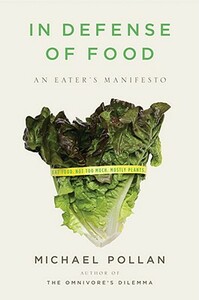You need to sign in or sign up before continuing.
Take a photo of a barcode or cover
informative
inspiring
One of the most life -changing books I've read. I will never walk down a grocery aisle again without thinking about this novel. Informative and refreshingly grounded
informative
medium-paced
informative
reflective
fast-paced
informative
medium-paced
informative
medium-paced
This book changed the way I eat and helped me to enjoy food more. Knowing all the “why” behind the differences in local/organic produce and meats vs. processed opened my eyes. Also, nutritionism and the politics behind a lot of food science was informative. Spending more on quality foods and spending more time preparing them feels even more worthwhile after reading. An important book.
This was a timely book for me as I struggle with my own food demons. Some of the references were inconclusive in my mind. The Aborigines for instance, there are a lot of unknowns that make the claims made about their return to their original environment and improved health.
I have seen a few reviewers complain about food costs and how lower income families can't afford to eat healthy. Non-organic fresh fruits and veggies are affordable. Even frozen fruits and veggies are affordable. And that is preferable to heavily processed foods.
My take away from this book is simple:
Eat real food
Eat whole foods when you can
Eat slower. It's not a race and it gives your stomach time to signal fullness.
Eat closer to home/locally grown
Eat more plants
Grow your own food (I've seen videos of people growing veggies on tiny balconies in NYC, if they can do it, anyone can).
Stop eating fast food (we know this)
While all of his sources may not check out, the overarching premise of the book does. Great advice.
I have seen a few reviewers complain about food costs and how lower income families can't afford to eat healthy. Non-organic fresh fruits and veggies are affordable. Even frozen fruits and veggies are affordable. And that is preferable to heavily processed foods.
My take away from this book is simple:
Eat real food
Eat whole foods when you can
Eat slower. It's not a race and it gives your stomach time to signal fullness.
Eat closer to home/locally grown
Eat more plants
Grow your own food (I've seen videos of people growing veggies on tiny balconies in NYC, if they can do it, anyone can).
Stop eating fast food (we know this)
While all of his sources may not check out, the overarching premise of the book does. Great advice.
This book was so hugely influential that I thought I had read it ten years ago. Turns out, it just seeped in through cultural osmosis! Pollan is so good on the problem of our food culture and nutritionism, and his broad-strokes solution (the famous "eat food, mostly plants") is phenomenally simple and reasonable and appealing.
He's probably right about the more specific solutions, too, including "don't eat anything your grandmother wouldn't recognize as food" and "shop mostly at farmer's markets." Really, there's nothing in these guidelines that I would contradict or deny, and these do seem like good goals. There's something about his tone in this portion of the book, though, that rubs me the wrong way. Maybe it's his tunnel vision as a Berkeley resident with a flexible job (which surely allows for more time to garden and browse the farmer's market) or the many generalizations about what "Americans" or "farmers" do. There's also a little hypocrisy in his treatment of omega-3 fatty acids as a stand-alone nutrient, an approach that he criticizes strongly (and I believe rightly) in the first part of the book.
This book has changed the way we think and talk about food for the better. I'm glad to have read it, finally, and will be considering some of these points for a long time to come. As I said, I think he's right about almost all of it--but slightly insufferable, too.
He's probably right about the more specific solutions, too, including "don't eat anything your grandmother wouldn't recognize as food" and "shop mostly at farmer's markets." Really, there's nothing in these guidelines that I would contradict or deny, and these do seem like good goals. There's something about his tone in this portion of the book, though, that rubs me the wrong way. Maybe it's his tunnel vision as a Berkeley resident with a flexible job (which surely allows for more time to garden and browse the farmer's market) or the many generalizations about what "Americans" or "farmers" do. There's also a little hypocrisy in his treatment of omega-3 fatty acids as a stand-alone nutrient, an approach that he criticizes strongly (and I believe rightly) in the first part of the book.
This book has changed the way we think and talk about food for the better. I'm glad to have read it, finally, and will be considering some of these points for a long time to come. As I said, I think he's right about almost all of it--but slightly insufferable, too.
informative
reflective
medium-paced






